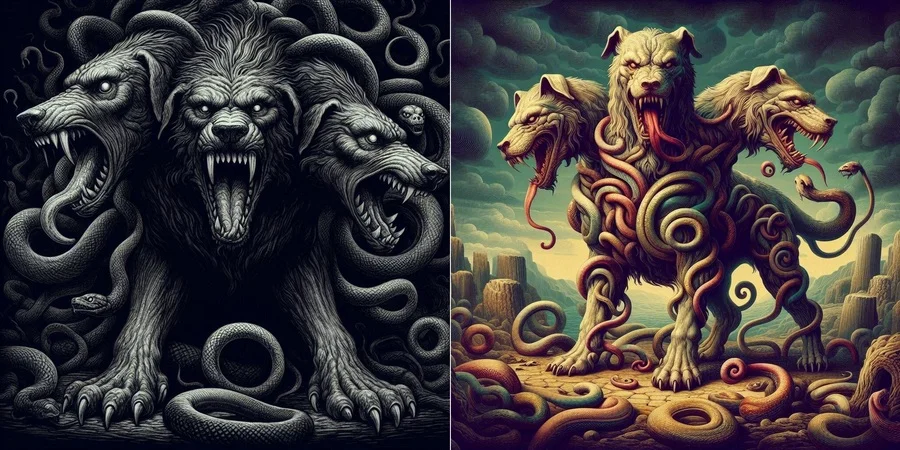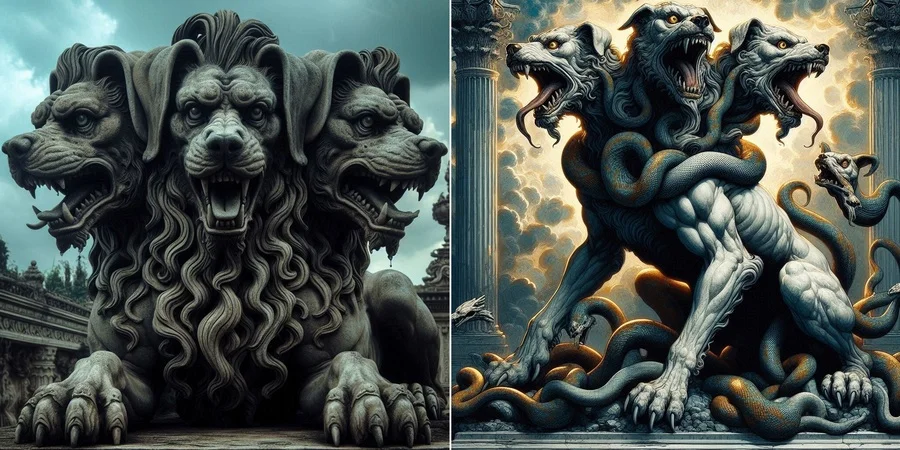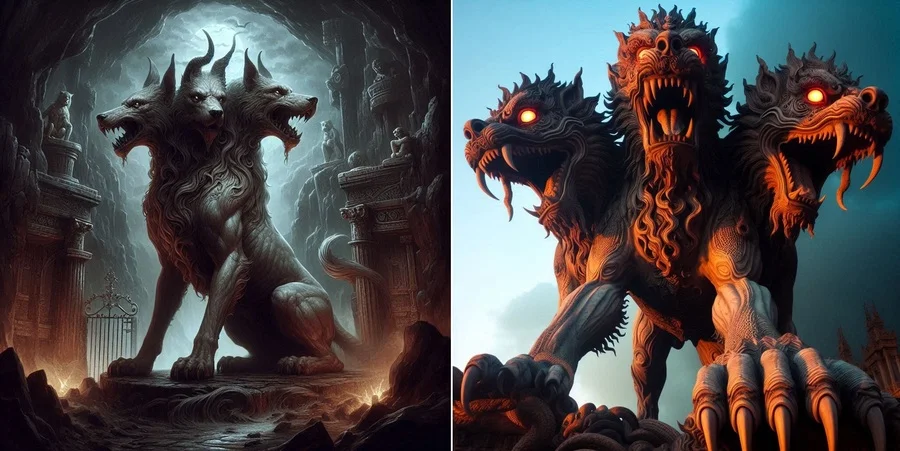
In Greek mythology, one figure stands out for its fearsome reputation and mysterious origins: Cerberus, the three-headed hound that guards the gates of the Underworld. Often depicted as a monstrous, snarling beast with serpents writhing around its body, Cerberus embodies the terror and power associated with the realm of the dead.
Who is Cerberus in Greek Mythology
According to ancient accounts, Cerberus was the offspring of Echidna, a half-woman, half-serpent monstrosity, and Typhon, a fearsome giant. Raised in the darkness of the Underworld, this multi-headed canine was tasked with preventing the souls of the deceased from escaping and the living from entering Hades, the realm of the dead. With its sharp claws and voracious appetite, Cerberus struck fear into the hearts of even the bravest mortals.
The legends surrounding the capture and interaction with Cerberus are as captivating as the creature itself. One of the most famous accounts involves the last labor of Heracles (Hercules), who was instructed to bring Cerberus to the surface world as part of his Twelve Labors. Displaying his incredible strength and cunning, Heracles managed to overpower the formidable beast, albeit with considerable difficulty, before presenting it to King Eurystheus as evidence of his indomitable spirit and prowess.
In the broader context of Greek mythology, Cerberus symbolizes the boundary between life and death, serving as a poignant reminder of the inevitability of mortality. Its monstrous form embodies the fears and uncertainties that mortals face when confronting the unknown realms beyond their existence. Cerberus represents not only the dread of the afterlife but also the inherent challenges that must be overcome in order to attain spiritual transcendence.

Despite its fearsome nature, Cerberus occasionally assumes a more nuanced role in Greek lore. Some tales suggest that the hound possesses a gentle side, allowing certain individuals to enter the Underworld unharmed. These rare glimpses of compassion hint at a complex duality within Cerberus, challenging the conventional perception of the creature as an irredeemable terror.
Cerberus Greek Mythology Facts
Firstly, Cerberus’s lineage traces back to the monstrous union of Echidna and Typhon, an ominous pairing that foreshadowed the birth of this formidable hound. Unlike conventional canines, Cerberus boasted three menacing heads, each equipped with razor-sharp teeth and an unwavering vigilance that deterred any trespassers from the gates of the afterlife.
Furthermore, the myth of Heracles (Hercules) and his triumphant encounter with Cerberus forms a cornerstone of the creature’s legend. As part of his Twelve Labors, Heracles bravely ventured into the depths of the Underworld, showcasing unparalleled strength and cunning to subdue the ferocious guardian and bring it to the mortal realm. This daring feat solidified Cerberus’s status as a symbol of Herculean strength and valor.
Moreover, beyond its fearsome reputation, Cerberus possesses a deeper symbolism within the context of ancient Greek beliefs. Serving as the embodiment of the boundary between life and death, this monstrous hound serves as a stark reminder of the inevitability of mortality and the complex interplay between the human world and the afterlife.
Interestingly, some lesser-known accounts depict Cerberus in a more compassionate light, hinting at its capacity for empathy and understanding. Amidst its intimidating exterior, the creature occasionally displays a softer side, permitting certain individuals to navigate the realms of the Underworld unscathed. This revelation adds a layer of complexity to Cerberus’s character, challenging preconceived notions and emphasizing the intricacies of its role in the mythological narrative.
Furthermore, the enduring legacy of Cerberus continues to reverberate across various forms of contemporary culture. From artistic interpretations to literary adaptations and modern reinterpretations in popular media, the three-headed guardian remains an enduring symbol of the human fascination with the unknown and the eternal quest for understanding the mysteries of life and death.
Cerberus Greek Mythology Powers
First and foremost, Cerberus’s most striking power lies in its formidable strength and agility, which enable it to fiercely ward off any intruders attempting to breach the gates of the Underworld. With its three sets of razor-sharp teeth and a menacing growl that reverberates through the realm of Hades, Cerberus stands as an impenetrable barrier against the escape of souls and the intrusion of the living into the domain of the deceased.

Additionally, legends describe Cerberus as possessing the uncanny ability to detect the essence of the souls attempting to traverse the boundary between the living and the dead. Its keen perception allows it to discern the nature of each individual, determining whether they belong in the realm of the living or if they are destined for the eternal embrace of the afterlife.
Moreover, Cerberus is often attributed with the power of heightened senses, enabling it to perceive even the faintest disturbances within the Underworld. Its acute awareness serves as a warning to the inhabitants of Hades, signaling potential threats or disruptions that may arise within the realm of the departed.
Furthermore, some ancient accounts suggest that Cerberus wields a mystical influence over the spirits dwelling in the Underworld, establishing a delicate balance that governs the order and harmony of the afterlife. Its commanding presence serves as a deterrent, ensuring that the souls of the departed adhere to the laws and regulations governing the realm of Hades.
Cerberus: A Greek Mythology Story
The stench of death hung heavy in the air as Melinoe, daughter of Hecate, goddess of magic, crept towards the gates of the underworld. Unlike Heracles, the famed demigod, Melinoe wasn’t there to capture Cerberus, the three-headed hound. She had a different mission, one born of desperation and a mother’s love.
Melinoe’s younger brother, Orpheus, the gifted musician, had succumbed to a poisonous viper’s bite. Heartbroken and unwilling to accept his fate, Melinoe sought a solution forbidden to most mortals – retrieving Orpheus from the clutches of Hades. The only way to navigate the treacherous path and reach the depths of the underworld undetected was to bypass Cerberus.
Legends spoke of Cerberus’ insatiable hunger and his weakness for a specific type of honey cake, baked by Persephone, queen of the underworld. Melinoe, skilled in herbal remedies and concoctions, had spent weeks crafting a replica. Instead of honey, though, she infused the cake with a potent sleep elixir, strong enough to lull even the most ferocious beast.
Reaching the gates, Melinoe felt the ground vibrate beneath her as Cerberus shifted. Three sets of eyes, one fiery red, one icy blue, and one a murky green, snapped open, fixating on the lone figure before them. A guttural growl rumbled from the three throats, sending shivers down Melinoe’s spine. Panic threatened to overwhelm her, but the image of her brother, his music forever silenced, spurred her forward.
With trembling hands, she tossed the cake towards the three heads. The one with fiery eyes, the most aggressive, lunged first. Just before snapping it up, a melodic voice echoed in Melinoe’s mind, a voice she recognized as her mother’s. It was a soothing lullaby, a song of forgotten dreams and peaceful slumber. The cake, imbued with the lullaby’s essence, momentarily distracted the fiery head.
Taking advantage of the hesitation, Melinoe began to sing aloud. Her voice, though untrained, poured out the lullaby, weaving a tapestry of sleep and tranquility. The icy blue head, usually alert, drooped, eyelids fluttering. The green head, known for its cunning, tilted in confusion, momentarily captivated by the strange melody.
In that sliver of a moment, the fiery head snapped up the cake and devoured it in a single gulp. A content sigh escaped its three throats, followed by a rhythmic thud. Cerberus, the mighty guardian, was fast asleep. Melinoe, heart pounding in her chest, slipped past the slumbering beast, venturing deeper into the underworld.
Her journey was fraught with peril. She navigated the River Styx, the mournful cries of the damned echoing in her ears. She outsmarted the skeletal ferryman, Charon, with a cleverly worded request blessed by her mother’s magic. Finally, she reached the desolate fields of Asphodel, where Orpheus resided among the shades.
The sight of her brother, his eyes vacant, his lyre silent, filled Melinoe with renewed determination. She sang the lullaby again, a desperate plea for his return. As the melody washed over Orpheus, a flicker of recognition sparked in his eyes. The music resonated within him, a familiar comfort pulling him back from the brink.
Slowly, with each repetition of the lullaby, the color returned to his face, his breath hitched, and finally, his eyes opened fully. Relief flooded Melinoe as she embraced her brother, the power of music and a mother’s love defying the boundaries of the underworld.
Together, they retraced their steps, navigating past the still-slumbering Cerberus. Once back in the land of the living, Orpheus awoke completely, his music restored. Melinoe, though exhausted, felt a warmth bloom in her chest. She had not only defied the laws of the underworld but also proven that love, in its many forms, could conquer even the most formidable guardians.
Frequently Asked Questions
What does Cerberus mean in Greek?
The exact meaning of Cerberus’ name in Greek remains debated by scholars. Here are the two main theories:
- “Spotted One” or “Speckled“: This interpretation comes from the Greek word “kerberos,” which could be related to “keras” meaning “horn” and might imply a spotted or speckled creature.
- “Evil of the Pit“: Another theory suggests the name derives from the combination of “Ker” meaning “death-demon” and “erebos” meaning “darkness” or “pit.”
While the exact meaning is uncertain, both interpretations paint a vivid picture of Cerberus, a creature linked to death and the underworld.
How big is Cerberus in Greek mythology?
In Greek mythology, Cerberus is often depicted as an enormous and fearsome creature. While specific dimensions are not provided in the myths, artistic representations and literary descriptions suggest that he is significantly larger than a normal dog, befitting his role as the guardian of the Underworld.
Who killed Cerberus in Greek mythology?
Cerberus wasn’t actually killed in Greek mythology. His role was as a guardian, and his monstrous nature ensured very few dared to challenge him. The most famous encounter with Cerberus is in the myth of Heracles (Hercules) and his twelve labors.
Heracles’ final labor required him to capture Cerberus and bring him to the surface world. However, Heracles didn’t kill Cerberus. He wrestled the beast and used his strength and cunning to subdue him long enough to bring him to the living world.
Is Cerberus Greek or Roman?
Cerberus originates from Greek mythology. While the Romans adopted many aspects of Greek mythology, including some of its deities and stories, Cerberus remains firmly rooted in Greek mythology.
| Cerberus’ role transcended that of a mere guard dog. He symbolized the finality of death. The dead could never escape the clutches of the underworld, forever bound by the watchful gaze of Cerberus. His monstrous form served as a chilling reminder of the consequences of defying the natural order. |